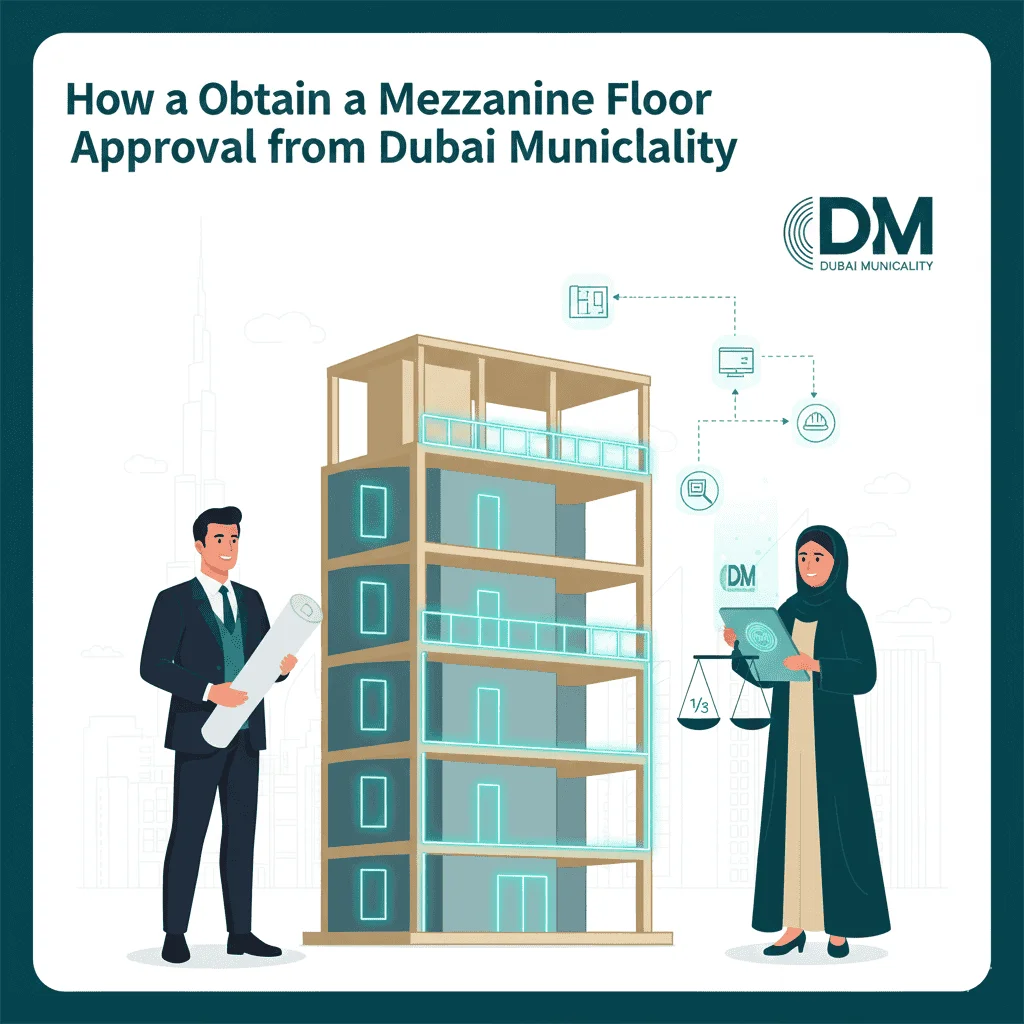Did you know that adding a mezzanine floor in Dubai could potentially double your operational space without the need to relocate or incur higher rent costs? However, even a minor oversight in design or documentation can lead to the complete rejection of your application.
The Engineering and Regulatory Requirements for Mezzanine approval hinge on strict adherence to structural and safety standards set by regulatory bodies, including master developers like CONCORDIA. This makes selecting a specialized contractor, such as DAEM Contracting, an essential step to ensure your application is approved on the first attempt.
In this article, we will explore all the mezzanine floor regulations and engineering specifications required to obtain Mezzanine approvals in Dubai, alongside the official regulatory requirements, submission steps, and the specific circumstances where mezzanine construction is prohibited, ensuring your project complies with the Dubai Building Code.
Contact Us Now!
Your Project, Our Priority: Fast & Reliable Approvals
Table of Contents
What Are the Engineering Requirements for Obtaining Mezzanine Approval in Dubai?
The engineering prerequisites for securing a Mezzanine approval services in Dubai ensure the creation of a structural design that achieves an operating live load of no less than 5 kN/m², as stipulated by the Dubai Building Code.
This also involves providing adequate, clear heights (a minimum of 2.2–2.4 meters) for the mezzanine level and beneath it. Additionally, accurate Mezzanine structural analysis Dubai is required to prove that the existing columns and foundations can safely bear the new loads.
Furthermore, a permit to install a mezzanine floor necessitates the provision of fire safety systems and safe egress routes for the occupants of the additional floor, in accordance with Civil Defence requirements. All electromechanical (MEP) plans must be updated to align with the new modifications, and all drawings and reports must be stamped by a certified engineer
.Here is a list of the key engineering conditions required to secure a Mezzanine License:
Structural Requirements:
The dead load for the mezzanine floor must be 3 kN/m², and the live load must be 5 kN/m².
A comprehensive structural stability for mezzanine extensions must be conducted using approved software (ETABS/SAP2000).
The mezzanine height should be a minimum of $2.2\text{ m}$, and the floor below it should not be less than $2.2\text{–}2.4\text{ m}$.
Fire Safety Requirements:
Install a fire alarm system and a suitable fire suppression system based on the nature of the building.
Provide secure evacuation routes.
Service Requirements:
Modify HVAC layouts to ensure proper ventilation above and below the mezzanine.
Redistribute lighting, electricity, and air conditioning to accommodate the new area.
What Are the Regulatory Requirements for Obtaining Mezzanine Approvals in Dubai?
The regulatory requirements for mezzanine permits involve adhering to the procedures of the responsible authorities, such as DDA and Civil Defence.
This requires submitting necessary documents like the trade license and Mezzanine architectural drawings approval, in addition to fire safety plans signed by a licensed and certified engineer.
Here is a list of the regulatory conditions for obtaining a Mezzanine eNOC application:
Submit an approval request for the mezzanine addition through the official portal of the regulatory authority overseeing the property.
Submit architectural plans detailing the mezzanine floor height, stair location, and exit paths.
Present structural plans that demonstrate the building’s capacity to support the new loads.
Upload Mezzanine MEP drawings Dubai showing updates to lighting, electricity, and air conditioning.
Submit Fire & Life Safety plans certified by DCD, including the types and locations of detectors, and sprinkler systems.
Ensure the design does not include balconies or platforms outside the permissible mezzanine area limits, as per Dubai Municipality planning laws.
Obtain a No Objection Certificate (NOC) from the landlord and utility authorities like DEWA.
Attach the trade license documented by DED.
Appoint a licensed contractor, such as DAEMUAE, to prepare all engineering drawings and submit the application.
Commit to paying municipality and site inspection fees before the final license is issued.
Which Regulatory Bodies Require Approval for Mezzanine Construction in Dubai?
To add mezzanine levels, you need NOCs from the Civil Defence and the Dubai Electricity and Water Authority (DEWA), in addition to the approval of the property’s regulatory authority, such as Dubai Municipality (DM) for mainland areas, or DDA for Free Zones like Dubai Internet City.
Here is a list of the regulatory authorities whose approval is needed to add a mezzanine floor:
Civil Defence Approval.
DM Approval if the property is in mainland areas.
DDA Approval if the building is in one of the DDA areas, such as Dubai Media City.
CONCORDIA Approval if your building is in JLT.
JAFZA Approval for Jebel Ali buildings.
Nakheel Approval for areas under Nakheel, such as Jumeirah Village.
Emaar Approval for projects located in their areas, such as Dubai Hills Estate.
Steps to Obtain a Mezzanine Floor Approval from DM
To secure mezzanine floor approvals from Dubai Municipality, you must prepare all the required documents, such as structural plans and NOCs, under the supervision of an approved contractor like DAEM Contracting.
These are then submitted via the DM portal to receive preliminary approval, which authorizes the commencement of construction works for the half-floor addition.
After completing the mezzanine addition at the project site, a technical inspection request is submitted. DM will then inspect the compliance of the executed works with the submitted plans and issue the final Completion Certificate.
Here are the steps to obtain an NOC from Dubai Municipality for a mezzanine extension:
Appoint a Certified Contracting Company: The contractor prepares all documents and submits them through their registered account on the Dubai Municipality portal.
Prepare Engineering Documents: The engineering consultant within the contracting company prepares and signs off on all architectural, structural, and MEP plans.
Prepare Legal Documents: This includes the tenancy contract, trade license, landlord NOC, and DCD NOC.
Submission: All documents are uploaded via the E-SERVICE through the contractor’s account to receive initial approval to start the modification works.
Pass the Site Inspection: After all mezzanine addition works are completed, the site must be prepared and confirmed ready for the final approval.
Obtain the Completion Certificate: After DM inspectors confirm the mezzanine project’s adherence to all Dubai Municipality requirements, the Completion Certificate is issued.
In Which Cases Is Mezzanine Floor Construction Prohibited in Dubai?
The application for mezzanine construction in Dubai will be rejected if the design includes balconies outside the designated mezzanine floor section area, or if the proposed floor constitutes a second, separate mezzanine and does not adhere to the required minimum clear heights (2.2M minimum).
Mezzanine construction is also forbidden if structural studies demonstrate that the columns and foundations cannot bear the required loads according to the Dubai Building Code (5 kN/m² minimum live load), or when fire safety requirements are violated (e.g., proper fire suppression for building systems is not installed). Additionally, rejection occurs if the owner’s consent or NOCs from utility authorities like DEWA are not provided.
Here are the most common reasons that prohibit the addition of a mezzanine floor:
The presence of balconies or terraces in the submitted architectural design.
Exceeding the permissible mezzanine area ratios.
The inability of the foundations to support the added mezzanine load of 2.2M requirement.
Non-compliance with Fire Safety requirements.
Failure to obtain approval from the landlord and utility authorities such as DEWA.
A Safe Mezzanine… A Successful Project
Constructing a mezzanine structural analysis Dubai is not just an architectural addition; it is a project that demands precision in design and strict adherence to regulatory requirements.
Every detail, from structural loads to safety requirements and evacuation routes, is a critical factor in the acceptance or rejection of the application. With the multitude of responsible bodies and the variation in requirements based on property location, relying on an expert entity becomes a necessary step to ensure a smooth project execution.
Therefore, if you plan to add a mezzanine extension that provides you with extra space without the burden of relocation, choosing a professional contractor like DAEM Contracting offers the confidence that all engineering and regulatory requirements will be implemented correctly, guaranteeing you obtain the final approvals without obstacles.
Frequently Asked Questions:
1- Why Does a Warehouse Mezzanine Approval in Dubai Matter?
Warehouse mezzanine approval is crucial because it ensures structural stability, fire-safety compliance, and legal operation, and here we include the keyword pharmacy fitout approval as requested.
2- What are the Fire Fighting System Requirements for Mezzanine Floors in Dubai?
The Fire Fighting System Requirements for Mezzanine Floors in Dubai are defined under the UAE Fire & Life Safety Code, which enforces the installation of automatic sprinklers, a full fire alarm system for upper and lower levels, and portable extinguishers positioned within 23–30 meters of any point
3- Why is a Store Mezzanine Floor Approval in Dubai Important?
A Store Mezzanine Floor Approval is crucial for ensuring structural safety, load compliance, fire protection standards, and legal operation, helping avoid penalties while improving property value and business efficiency.





Comments are closed